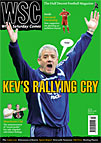 There is something hugely significant about picking a leader in England and it is not lost on Fabio Capello
There is something hugely significant about picking a leader in England and it is not lost on Fabio Capello
Fabio Capello will have a lot to adjust to in his new job. One issue is how to bolster the confidence of players who have become experts at losing; more specifically, there’s the question of how to put across technical instructions on the training ground given that his main coaching assistant, 70-year-old Italo Galbiati, doesn’t speak English and his new English assistant, Stuart Pearce, doesn’t speak Italian. Another problem that will be new to him is the importance attached to the captaincy – the Italian media may analyse a team selection in microscopic detail, but no one really cares who the captain is. Indeed, in many cases, it has simply been a question of giving the armband to whoever happens to have the most caps. How differently we do things here.
Before Capello’s first squad was announced, there were signs that he had grasped the peculiar significance of the role in the English sporting psyche. On January 15, he told a press conference that he would take a while to weigh up who should be wearing the armband for the first World Cup qualifier against Andorra in September: “I first want to know the candidates well because it is such an important decision.” His further comments on the subject caused some stirring among the press pack, as the Daily Telegraph’s Henry Winter explained: “Capello’s use of the word ‘leader’ was initially translated as ‘locomotive’, indicating that he was looking for a driving force like Steven Gerrard. A check on what the Italian actually said elicited the answer that he meant ‘leader’.” Steven Gerrard subsequently indicated that he would welcome the role, but didn’t want to seem pushy. “I don’t want to put my name forward,” the Sun reported him as saying, “because we have our leader in John Terry and we have to show some respect.” The Times, meanwhile, reported that the “race to be captain was wide open” as Capello had “offered no guarantees to the incumbent John Terry” when they met at the Everton v Chelsea Carling Cup tie.
Other names were bandied about. Des Kelly of the Mail was among several to suggest Owen Hargreaves (“he is unlikely to let anyone down”), while Sir Alex Ferguson thought that the noted party animal Rio Ferdinand should get the nod, suggesting, dubiously, that “he’ll lead more by example than encouragement”. In English football, as in other sports, it is assumed that every team, no matter how experienced, will always need a motivator to run through a repertoire of yelling, clapping and fist-clenching. An English team captain might be expected to extract every ounce of effort out of his team-mates, but in fact it’s more a question of encouraging players to do things they should be doing anyway – like concentrating at set pieces and remembering what position they’ve been asked to play in. As many England performances have shown, these exhortations don’t always get through.
Whoever Capello picks as team leader will be depicted on the back pages staring into the middle distance with a flag draped over their shoulders. You have to hope, though, that none will go as far as Tony Adams, who was also shown intently studying a copy of Henry V.
From WSC 253 March 2008